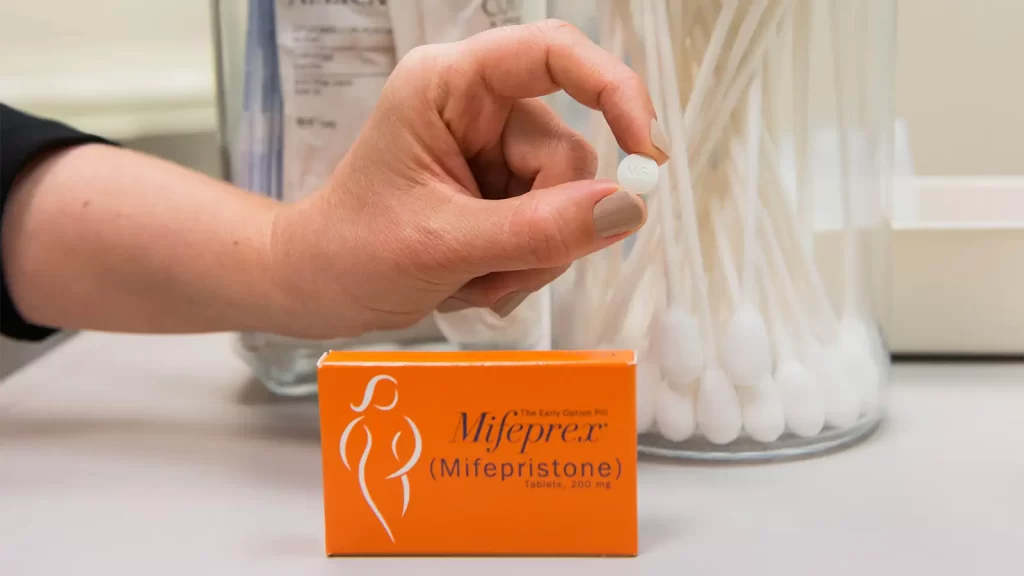Pregnancy stages and the type of termination are two factors that influence abortion care. The two most common methods of ending a pregnancy are surgical and medication.
Medication abortion also referred to as Plan C, is a pill-based procedure.
How much does an abortion pill cost? Plan C consists of a two-drug regimen. Without insurance, a one- to two-day course of this medication can cost more than $500. Abortion pills are expensive because of a variety of factors.
What is an abortion pill?
The “abortion pill” is a combination of two prescription drugs, which must be taken over a few days to be effective. To end a pregnancy, patients take Mifepristone (Mifeprex) and misoprostol (Cytotec).
The Food and Drug Administration has approved this medication-abortion regimen (FDA). Pregnancy up to 11 weeks may be treated with these drugs by some doctors.

How do medical abortions work?
Prescription drugs are used in medication abortions. Over a few days, two different pills can be taken to get the most out of the treatment.
First abortion pill
- Mifepristone is the active ingredient in the first pill (Mifeprex, or RU-486). Pregnancy development is halted due to this medication inhibiting the primary pregnancy hormone.
- You must see a doctor get Mifepristone, but you don’t have to see a doctor in person.
- One 200 mg mifepristone tablet should be taken on the first day. At least in some states, a doctor or nurse must be present when you take your first pill. After taking the first medication, you must wait between 24 and 48 hours before taking the second.
- After taking the first pill, some women report mild cramping, nausea, diarrhea, or even vaginal bleeding. But, most of the time, these symptoms are manageable and won’t disrupt your daily routine.
Second abortion pill
- The second medication, misoprostol, is administered one to two days after the first (Cytotec). Four 200-mcg tablets are the FDA-approved dosage.
- Misoprostol, like a heavy period, causes cramping and bleeding.
If you’re less than ten weeks pregnant, you can safely take this medication home. - Expect heavy vaginal bleeding within four to six hours of taking misoprostol. Then, for a few weeks, there is a possibility that light bleeding will continue.
- A misoprostol overdose could be necessary if your uterine bleeding is too heavy to terminate the pregnancy successfully.
You could also use a single pill for multiple doses of medication for abortion.
Misoprostol only
- If you can’t get your hands on Mifepristone, you can take misoprostol instead.
- Taking two different pills is a better option. In the first trimester of pregnancy, the combination is 97% effective, and misoprostol alone is about 80% effective.
- Take four 200-mcg tablets with a full glass of water before bed.
- Four more misoprostol tablets are given to you 3 hours after the first dose.
- Take the third round of 4 pills 3 hours after the second dose for those more than nine weeks pregnant. A total of 12 drugs will be consumed. You’ll need to take the third dose of misoprostol if bleeding hasn’t started within three hours of the second dose.
How does a medication abortion procedure work?
All 50 states and the District of Columbia allow the use of abortion pills. However, every state and District of Columbia have different rules about when and how to terminate a pregnancy.
Allowing providers to refuse to provide abortion care is one way many states have restricted abortion access in various ways. Abortion pills cannot be obtained through virtual visits in some states. A medication abortion may necessitate one, two, or even more in-person visits from you.

During the ongoing COVID-19 pandemic, the FDA decided to allow mail-order access to abortion pills in December 2021 permanently. You can meet with a healthcare provider in person or via a virtual visit to get a prescription. As a result, more women will be able to obtain abortion pills and perform a medication abortion at home.
Abortion laws in each state are updated regularly by the Guttmacher Institute. In addition, the National Abortion Federation Hotline 800-772-9100 or Repro Legal Helpline 844-868-2812 can also help you find answers.
How much does an abortion pill cost?
When it comes to abortion pills, many variables can affect your out-of-pocket costs.
- How often should you take your medication?
- Regardless of whether or not you have medical insurance.
- Where you reside
- Abortion fund donations are greatly appreciated.
Medication abortion can cost up to $750, according to Planned Parenthood, but it is frequently less. Without insurance, the price tag can reach upwards of $500.

Is it possible to purchase an abortion pill over the counter?
Medication abortion drugs can only be obtained with a doctor’s prescription in the United States.
Where can I buy an abortion pill?
Planned Parenthood clinics and telehealth providers can provide you with a prescription for abortion pills (depending on where you live). You can pick up the medication in person, go to a pharmacy, or order it online.
Does my insurance cover medication abortion?
Your health insurance plan may cover abortion. Your plan’s coverage and out-of-pocket costs can include:
- Private insurance and Affordable Care Act marketplace plans: As a result of the Affordable Care Act, abortion services are not deemed essential health benefits. Abortion care is not a requirement, but an option that plans have.
- Medicaid: Pregnancy termination is not permitted under Medicaid except in cases of rape, incest, or endangerment of the mother’s life. However, a study by the U.S. Government Accountability Office found that 14 state Medicaid programs did not cover Mifepristone in rape, incest, and life-endangerment cases. Some states use their own money to pay for Medicaid-eligible women’s abortions.
- Medicare: Pregnancies resulting from rape or incest, or those that a doctor determines to endanger the mother’s life, are not covered by Medicare.
Can I get help paying for an abortion medication if I don’t have health insurance?
If you don’t have insurance or your health plan doesn’t cover medication abortion, there are abortion funds that may be able to help.
Organizations and funds exist to help pay for abortions, from pills to procedures to transportation costs. For example, the National Abortion Funds have a state-by-state list of funds and advice on getting financial help.
National funds include:
- National Abortion Federation Hotline: For financial assistance, you can call this hotline, which is available in multiple languages.
- Women’s Reproductive Rights Assistance Project: For a medication abortion, this organization pays the provider directly to cover the costs.
- Indigenous Women Rising: Indigenous and undocumented people all over the country benefit from this fund.

What additional costs should I take into account when pursuing a medication abortion?
In addition to the cost of the pills, a medication abortion may include:
- Lost wages
- Extra medication
- Follow-up care
- Provider visit(s)
- Prescription medication
- Transportation, if you need to travel to see a provider in person
- Lodging
- Child care
How long does it take to get a medication abortion?
A one- to two-day course of prescription pills is needed for a medication abortion. However, a more advanced pregnancy, failure to expel your uterine contents, or other complications may lengthen the time it takes for a medication abortion.
What are the risks and dangers of having a medication abortion?
Abortion pills, especially misoprostol, can have many unwanted side effects. These include, but aren’t limited to:
- Vomiting
- Headache
- Diarrhea
- Dizziness
- Cramping
- Vaginal bleeding
- Nausea
- Weakness
- Fever or chills
Is a medication abortion painful?
A medication abortion may leave you feeling uneasy. Cramps are the most common cause of this discomfort. An over-the-counter analgesic may be prescribed, or you may be given the option of taking a prescription painkiller. Medication abortion has a low risk of complications, as well.
After a medication abortion, how long should you expect to bleed?
You should expect heavier monthly vaginal bleeding as the pregnancy is expelled from your body. Clots and tissue can be present in this blood. Cramps often accompany bleeding, indicating that the medication is working.
Some bleeding or spotting can last for a few weeks or even a few months during the first trimester of pregnancy. Wearing sanitary pads may be necessary during this time.
Surgery may be necessary if the bleeding is hefty.
Can the abortion pill make you infertile?
According to the American College of Obstetricians and Gynecologists, abortion does not affect future health or increase the risk of infertility in most cases. After a medication abortion, you can also become pregnant again. If you don’t want to get pregnant again right away, you should use preventive measures like condoms or birth control.

Is medication abortion a standard method of ending pregnancies?
An estimated 49% of all pregnancies terminated in the first trimester were surgical, according to the Centers for Disease Control and Prevention 2018. However, in 2016, 42% of pregnancies ended because of medication abortions performed at nine weeks or less. By 2020, more than half of all abortions in the United States will be medication abortions.
The Bottom Line
You can terminate a pregnancy using two prescription pills, the “abortion pill.” If you don’t have insurance, a medication abortion can cost you more than $500 on average. If you have health insurance and your care is covered, your out-of-pocket expenses may be lower.
Depending on the state, a medication abortion may require one or more in-person visits. If you need to travel to another state to get your abortion pills, have complications, or need more follow-up care, you may have to pay more. Financial assistance for a medication abortion may be available through various sources.
Frequently Asked Questions (FAQs)
What is the price of misoprostol?
Misoprostol's price varies from country to country. As a result of its widespread availability, misoprostol isn't particularly expensive. Pharmaceutical companies buy the pills from manufacturers for pennies on the dollar. In a recent study, the highest selling price per pill was found to be USD 2.
What is the name of the abortion pill?
Mifepristone and misoprostol are the two medications needed for a pill-based abortion. To safely and effectively empty the uterus, a process akin to a miscarriage can be started using them together or misoprostol alone. When combined with other medications, misoprostol is less effective and still highly safe. Because Mifepristone is not readily available in many areas, this is a common approach.
Mifepristone blocks the activity of progesterone (a hormone needed to maintain a pregnancy) in the uterus and softens the cervix, so the pregnancy comes out more quickly. Misoprostol makes the uterus contract and push out the pregnancy. This is similar to what happens when a person has a miscarriage.
When both medications are available, Mifepristone is taken first; then misoprostol is taken 1–2 days later. Mifepristone is always swallowed. Misoprostol is put in the mouth to dissolve, either in between the cheek and gum or under the tongue.
What is the price of Mifepristone?
It may cost US$83.33 per 200-mg tablet in the United States to use a mifepristone regimen, but the additional cost is only between US$22 and US$32. According to the country's official statistics, a mifepristone regimen costs less in India than a misoprostol-alone regimen.
Does abortion hurt?
Everyone's abortion experience is different; it can be excruciating or uncomfortable. In addition, pregnancy-related symptoms, such as pain and cramping, can affect how painful it is to be pregnant.




